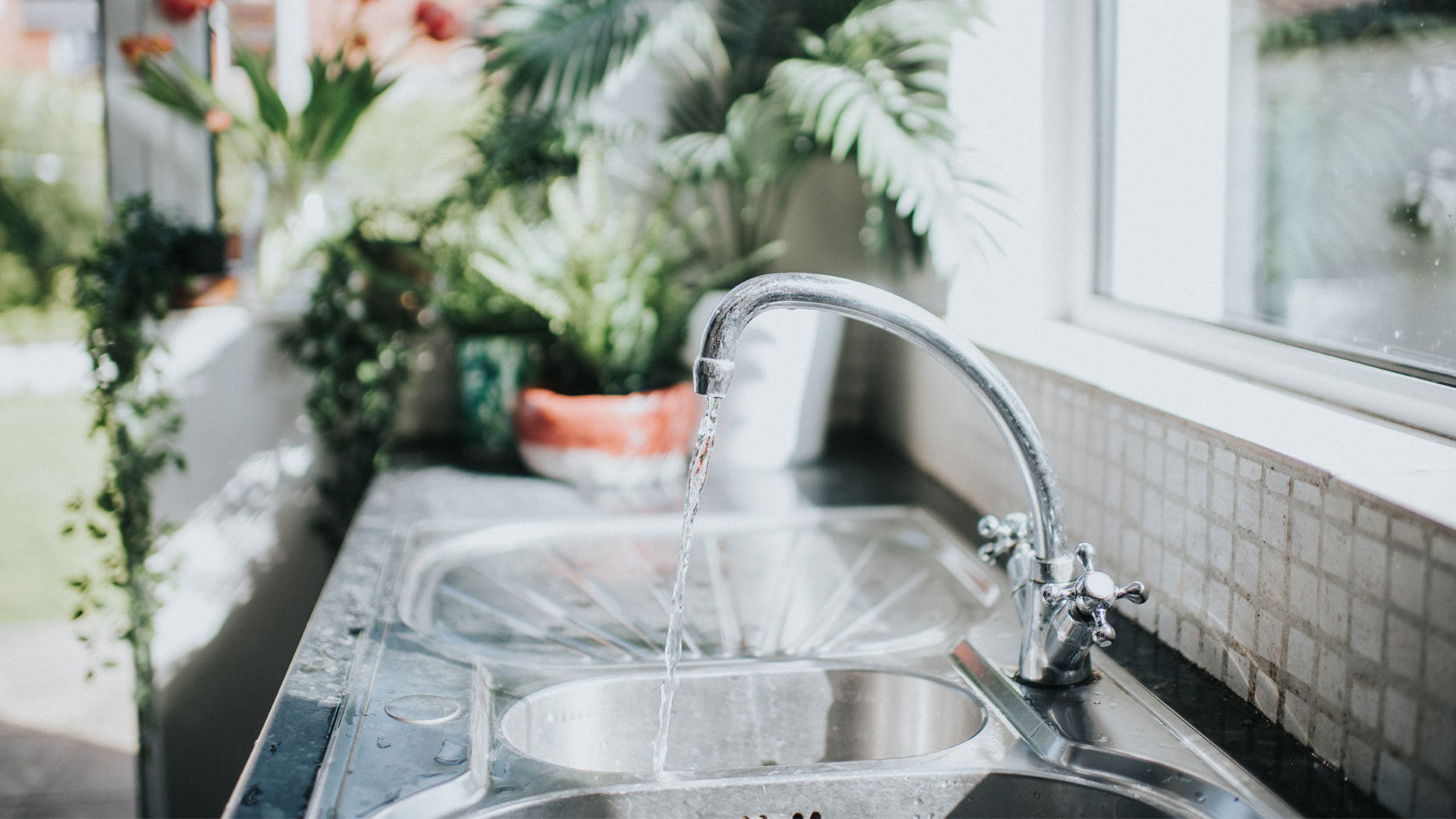The best water softeners are essential if you live somewhere with hard water. That’s because without one of these handy appliances, your water will likely leave a heavy build-up on taps and showers, and you’ll find that the shower screen in your bathroom doesn’t ever look sparkling clean anymore. Aside from how it seems, hard water can also cause problems with your water-fed appliances.
In our guide to the best water softeners, you’ll find a choice of salt-free water softeners and salt-based options. Salt-free water softeners don’t require any draining; they work by changing how the calcium reacts in your water. Salt-based water softeners, however, soften the water by exchanging the complex water ions with salt water ions. Once this happens, the tank will extract a salty brine that requires draining.
But how do you know the right water softener for your home? This all depends on how many water outlets you have. For a house with a few bathrooms, you’ll need a powerful water softener to take on the job. Its GPM (gallons per minute) flow rate measures this power.
To help you calculate what type of water softener you need, consider that a faucet uses 3 GPM and a shower uses 5 GPM. To apply this to your home, add up all of the faucets in your home and take your pick from the best water softeners to find a suitable option.
Read our best water heaters guide if you’re looking for other home essentials.
The best water softeners we recommend
Why you can trust Top Ten Reviews Our expert reviewers spend hours testing and comparing products and services so you can choose the best for you. Find out more about how we test.
Top Ten Reviews is on a mission to review everything we feature in our buyer's guides. Still, while we work hard to make this a reality—or where this isn't possible—some of our guides still feature rankings based on our team's considerable expertise and research.
While we haven't been able to test any of the units in this guide in person, we've instead honed in on top-rated brands and used our knowledge of the best features to help you make the right decision for your home, all for the best price.
The best water softener overall
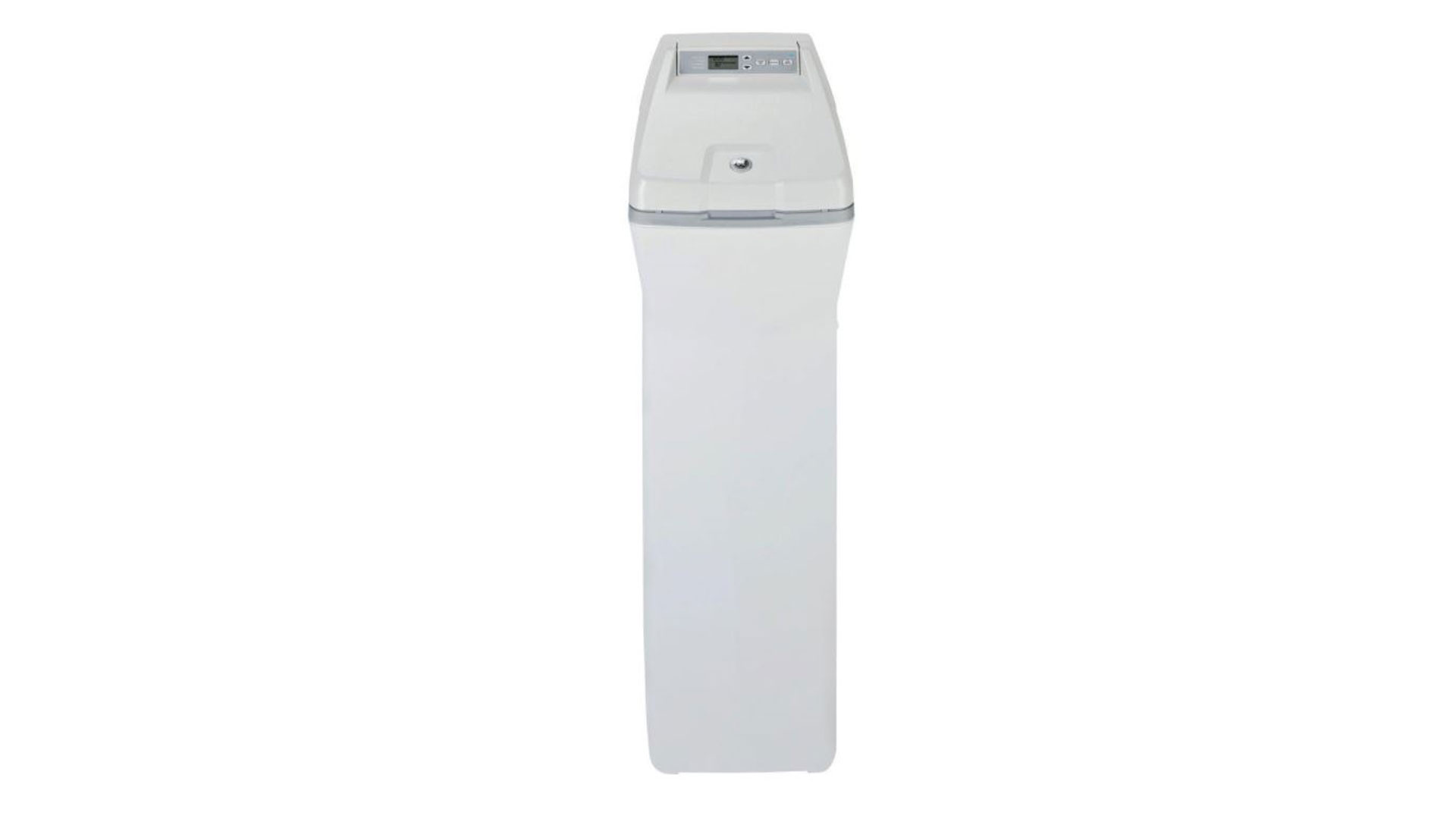
The GE GXSH40V 40,200 Grain Water Softener has a grain capacity of up to 40, 200, and has a flow service rate of 9.5. This makes the GE GXSH40V 40,200 Grain Water Softener an ideal choice for households with four people. If you have more members or lots of bathrooms in your home, you will be better off with a more powerful water softener.
Users gave the GE GXSH40V 40,200 Grain Water Softener an average rating of 4.4 out of five stars on Home Depot’s website. Positive reviews mentioned how easy to install this water softener is and that it’s ‘great value’. Some reviews, however, reported problems with the softener arriving faulty.
This salt-based machine has easy-to-use electronic controls but it also features SmartSoft technology which aims to take the guesswork out of making sure you have enough soft water for your home. This machine will get to know your household's water use and adapt accordingly.
As this is a salt-based water softener, you will need to refill the salt tank, but an empty indicator on the machine will let you know when to do this.
Another clever feature that we like is the functionality to choose how soft you want your water to be, as well as the ability to schedule the regeneration cycle at a time to suit you.
There's a one-year warranty on this entire appliance for added peace of mind and the water softener offers good value for money.
The best large capacity water softener
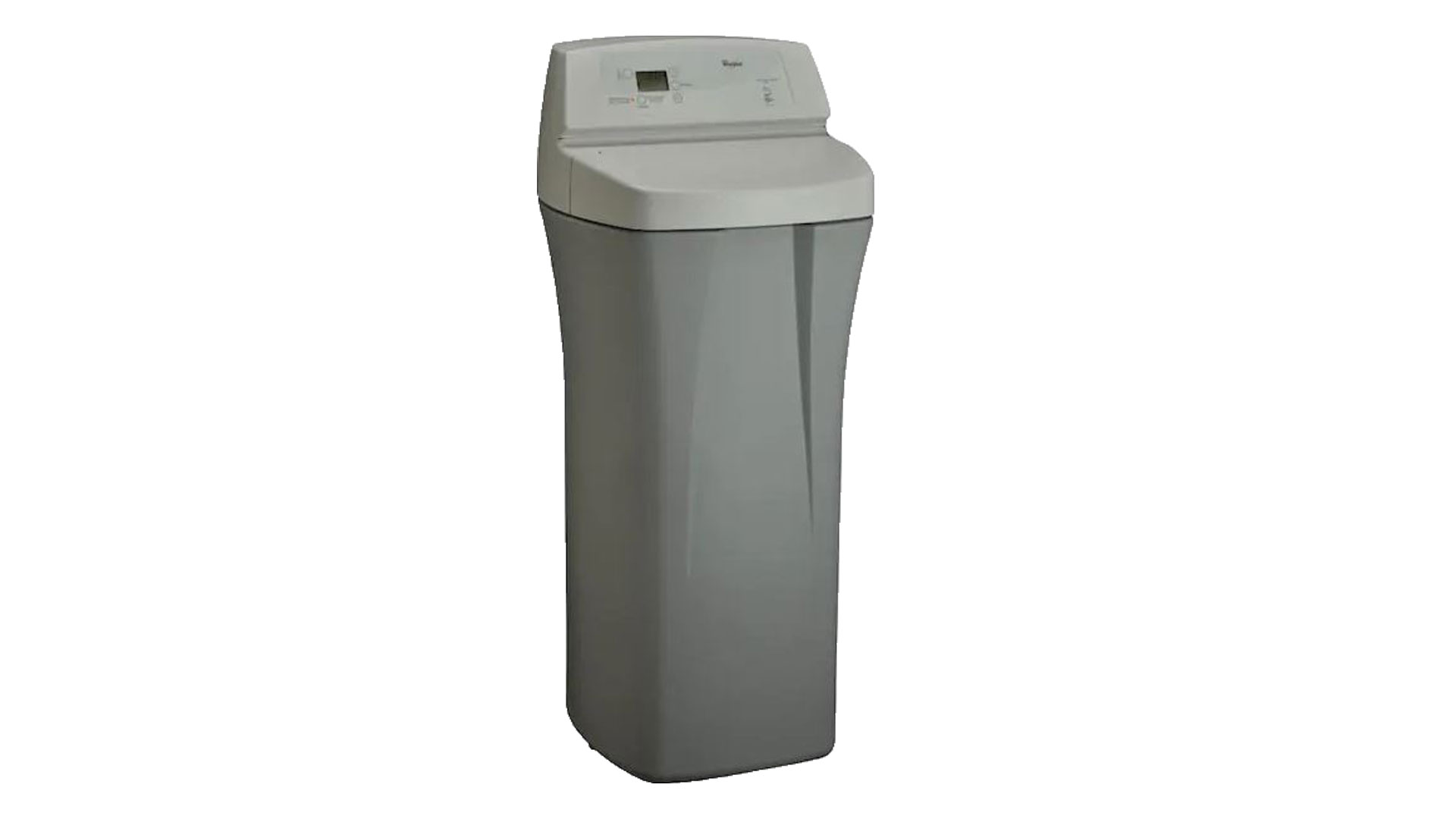
The Whirlpool WHES44 44,000 Grain Capacity Water Softener can remove up to 140 GPG of hardness from your water and has a large grain capacity, making it suitable for family homes.
The Whirlpool WHES44 44,000 Grain Capacity Water Softener has an average rating of four out of five stars on Lowe’s website. Users claim that this water softener is easy to install and that it’s compact. One user claims they’ve had ‘5 years of flawless operation’. Some users, however, state that the salt erodes this tank quickly and there’s ‘no water usage data available.’
The water softener’s control panel lets you choose the regeneration start time and there’s an in-built sensor that triggers the regeneration cycle. What’s more, the Whirlpool WHES44 Water Softener has a one-piece cabinet design, this means it doesn’t take up a huge amount of space as the resin tank is housed inside the salt reservoir.
The Whirlpool water softener offers a flow rate of 9 GPM, placing it just behind our top pick from GE. As with the GE model, you'll need to power this water softener with electricity and it does require draining due to it being salt-based.
Regeneration uses around 43 gallons of water to cleanse the media and the Whirlpool WHES44 Water Softener also has an iron removal setting which activates and an extra backwash cycle to remove excess iron buildup.
The best water softener for small homes
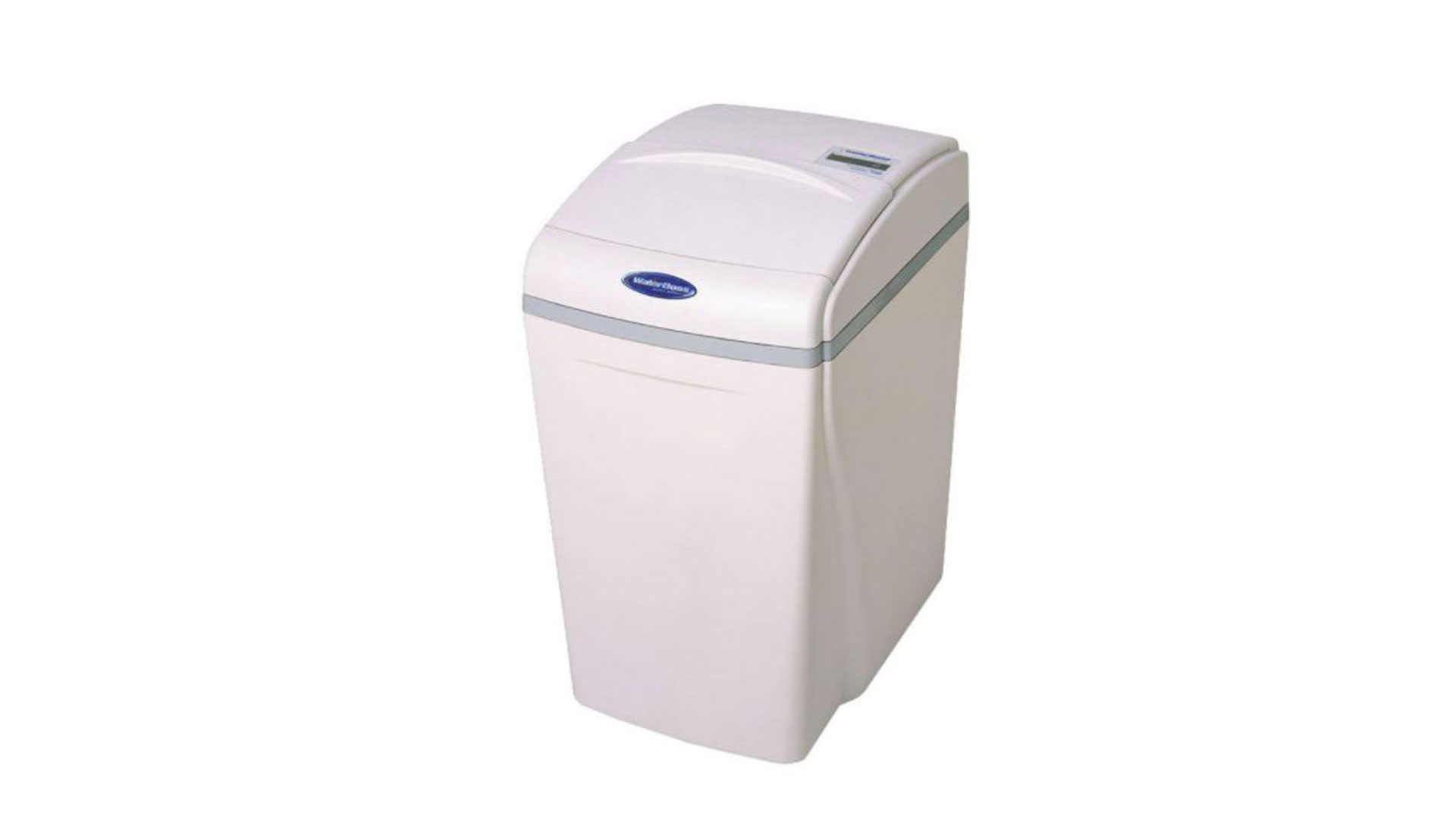
The WaterBoss 700 22,000 Grain Capacity Water Softener uses salt to treat hard water. This machine can take on water with a hardness of 70 GPG and it can hold up to 22,000 grains of hardness before it needs to regenerate.
The WaterBoss 700 22,000 Grain Capacity Water Softener scored an average of 4.2 out of five stars on Home Depot’s website. Users commented on how easy to install this unit was, and that it was ‘incredibly reasonably priced’. Some users criticize the sturdiness of the cabinet.
The WaterBoss water softener is one of the smallest capacity units in our round up, however, it has one of the highest flow rates at 16 GPM, making it a powerful choice considering its size.
What’s more, this water softener also has a self-cleaning sediment filter that traps sediment before it gets into your plumbing and causes further issues. The
WaterBoss has a regeneration cycle that takes about 19 minutes, which is fairly quick for a water softener. As with the models we've included in our guide, the WaterBoss water softener lets you schedule when you want the regeneration cycle to start, and there's also a self-cleaning cycle.
The best saltless water softener
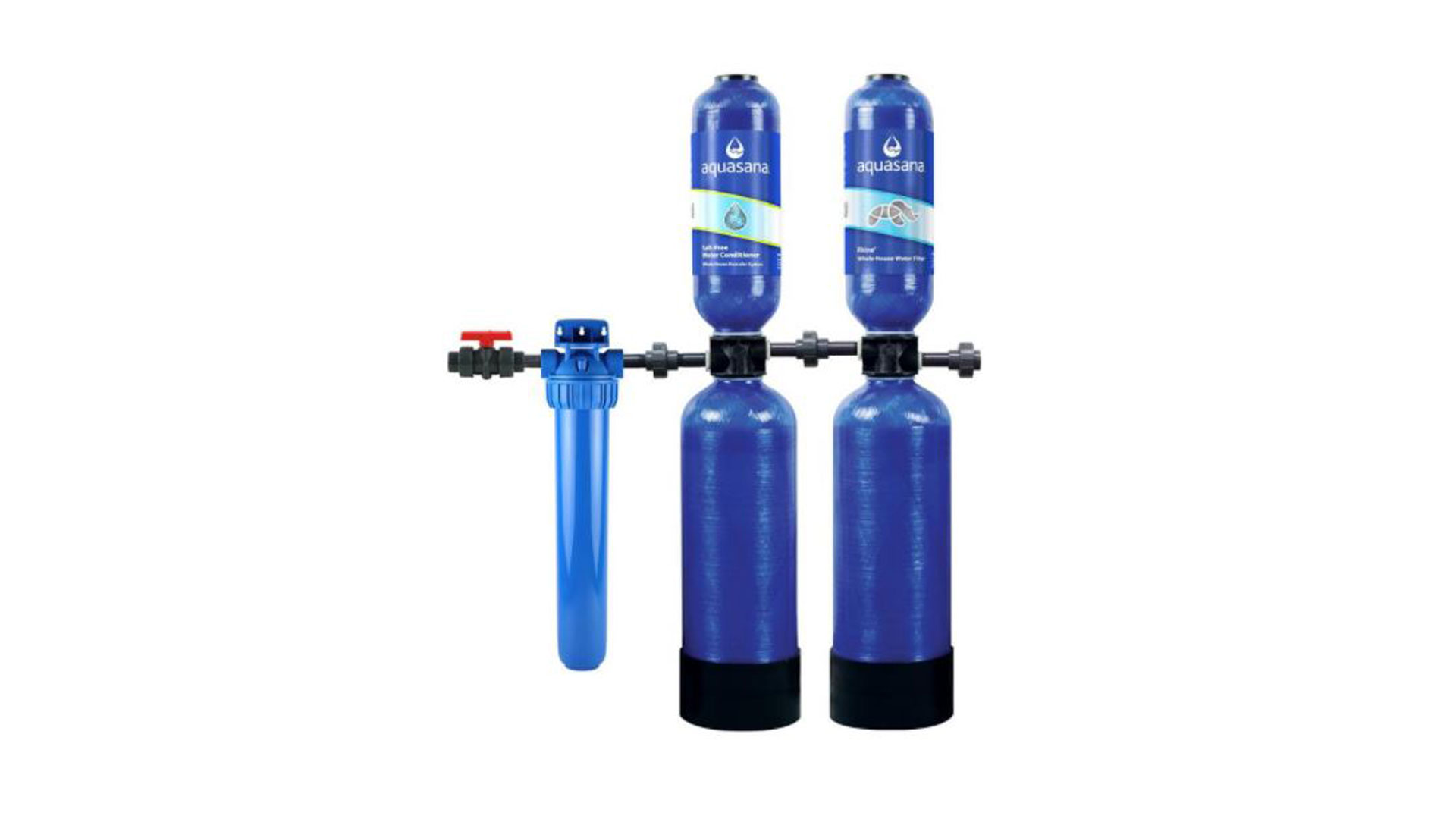
The Aquasana 1,000,000 Gallon Rhino water softener is a saltless option that is suitable for homes with up to 3.5 bathrooms. Because this water softener doesn’t require any salt, it also won’t need to regenerate in order to empty out all of the salty brine.
The Aquasana 1,000,000 Gallon Rhino water softener has an average user rating of 3.8 out of five stars on Amazon. Some users said this water softener is ‘worth the money’ and installation was easy. Others do mention that this water softener will decrease your water pressure and many mention issues with customer service and damaged boxes.
Instead of using salt, the Aquasana 1,000,000 Gallon Rhino water softener uses filters to get rid of excess calcium, bacteria, and unwanted particles from your water. What this means, is that your water won’t be any softer as such, but instead, it won’t contain the minerals that clog up your pipes and cause issues.
What we also liked about the Aquasana 1,000,000 Gallon Rhino water softener is that you can add optional filters that can remove bacteria and kill viruses in the water. This requires a UV filter, which will need an electrical hookup.
The flow rate of this water softener isn’t the most powerful at 7GPM, however, and you will pay a premium compared to salt-based water softeners but you should expect this unit to last a little longer.
For added peace of mind, the Aquasana has a ten-year warranty, but this doesn't cover the filter cartridges.
The best whole-house water softener
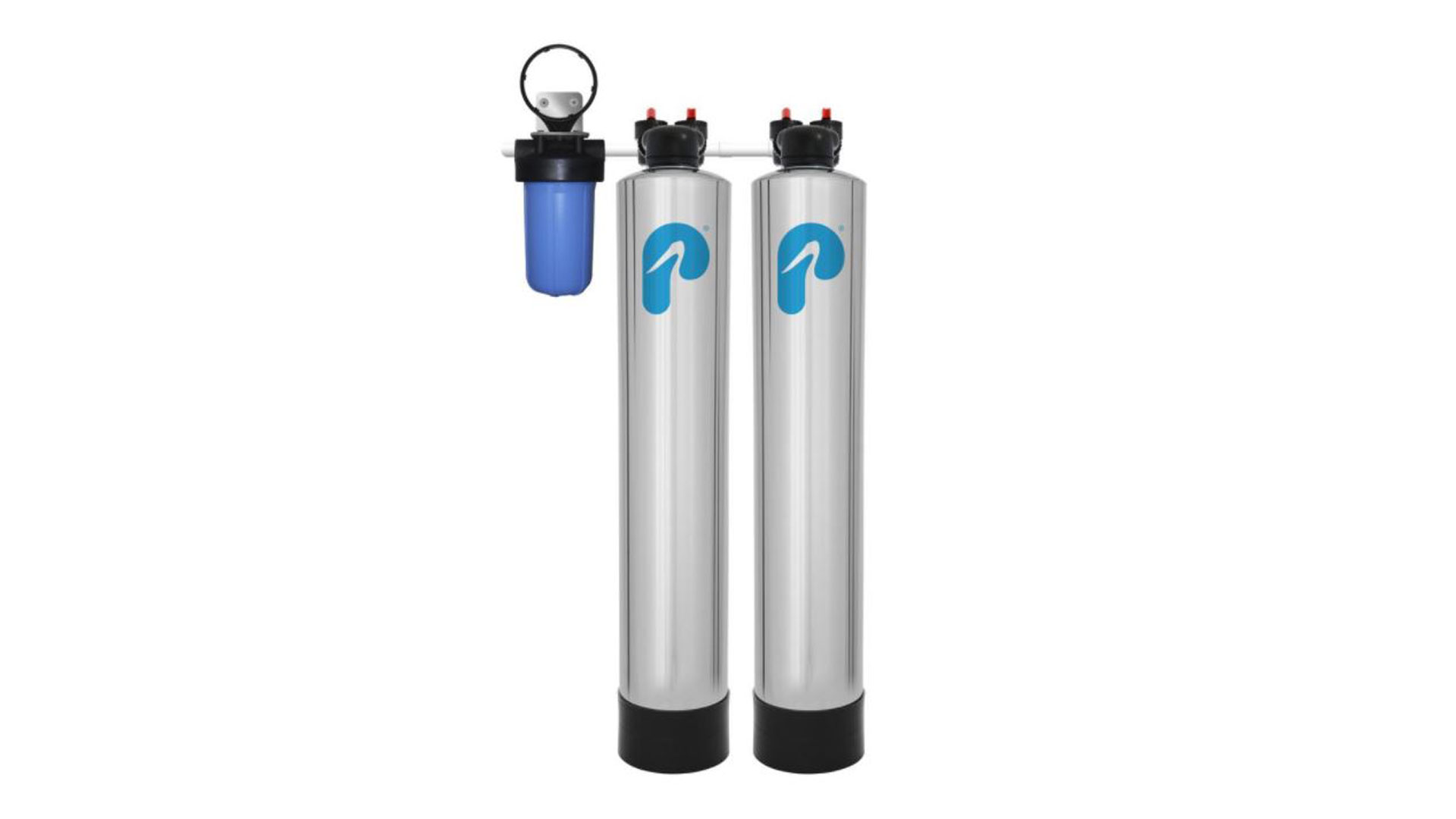
The Pelican THD-PSE1800 Water Softener is a saltless model which can treat hard water across an entire home. Pelican offers a variety of sizes for this water heater, and its biggest has a flow rate of 15 GPM and is suitable for homes with up to six bathrooms.
The Pelican THD-PSE1800 Water Softener scored an average of 4.7 out of five stars on Home Depot’s website. One user explains that this unit is a great alternative to an electric model, they added ‘it’s completely self attending - no electricity, no chemicals, and no maintenance other than changing the sediment filter.’ Some users explained that they were ‘disappointed’ that this unit didn’t solve their water hardness problems.
The smaller option of this water softener has a flow rate of 10 GPM and has been designed to tackle hard water in homes with up to three bathrooms.
You will have to maintain this water softener in order to get the most out of it. For example, the prefilter media and other parts will need replacing around twice a year if you use this unit regularly.
This water softener also has a carbon filtration media that will need to be replaced every five years - this is a more complex job where you need to disconnect the filter tank for 48 hours before you can use the water softener again.
As with other saltless water softeners, you’ll also pay more than you would typically for a salt-based water softener, however, typically you should expect your water softener to last a bit longer too.
How to choose the best water softener for your home
Here are the key factors to keep in mind when choosing the best water softener for your home:
Water Hardness: Test your water's hardness levels with test strips. Knowing the hardness level (measured in grains per gallon) will help you choose the right softener.
Types of Water Softeners: Two kinds of water softeners exist: salt-based and salt-free. Salt-based softeners remove hardness minerals with ion exchange, while salt-free softeners condition water without removing minerals.
Capacity: To find the right capacity, check the manufacturer's recommendations based on the number of people in your home and the hardness level of your water.
Efficiency and Flow Rate: To minimize salt and water waste, look for a model that regenerates efficiently. Also, consider the system's flow rate.
Maintenance Requirements: Some softeners need regular salt replenishment and filter changes, while others don't.
Budget: Find a balance between quality and affordability by determining initial and ongoing maintenance costs.
What the experts say
Choosing the right water softener for your home can be a struggle, so, we've found some expert advice from PremierWater Technologies Minnesota.
“The first thing you should determine is the actual size of softener you need. A water softener that is too small will frequently run out of soft water, reduce water pressure, require more service, and have a reduced service life.
Oddly enough, a water softener that is too big can suffer from a different set of problems.
Water softeners are full of small plastic beads called ion exchange resin. These resin beads remove hard water minerals by pulling them out of the water – much like a magnet.
A water softener’s capacity is based on the amount of resin inside the unit. 1 cubic foot of resin can remove 32,310 grains of hard water minerals (calcium, magnesium, iron, and manganese)."
Water softener FAQs
What are the main benefits of using a water softener?
In ion exchange, water softeners replace minerals in hard water with sodium. They usually have two tanks: one with polystyrene beads and the other with salt and brine. Sodium ions are released into the water as water flows through the resin tank, adhering to the negatively charged beads as it passes through them.
As a result, softened water keeps scale out of pipes and appliances, improving their life. Salt-softened water also enhances soap and detergent effectiveness, giving them more bubbles and cleaner results. As the absence of harsh minerals can promote better skin hydration, many people with dry skin prefer this type of water. It's also great for cleaning clothes and household items.
However, there are drawbacks to using salt-based water softeners. The regeneration cycle requires electricity and a wastewater drain. Also, you have to buy and replace salt regularly. Some users complain about softened water feeling slippery, and may not be a good idea for people on low-sodium diets or houseplants that are sensitive to salt levels.
Some high-quality systems automate this process during off-peak usage hours, typically at night. Over time, resin beads become saturated with minerals and need to be regenerated.
What are the different types of water softeners available on the market?
Different types of water softeners are designed to solve hard water problems differently.
Ion Exchange Water Softeners are the most common type. They use resin beads to exchange calcium and magnesium ions with sodium ions.
Salt-Free Water Softeners: Instead of softening water, these systems prevent scale buildup using template-assisted crystallization. Salt-free systems are ideal for those seeking low-maintenance options and are often marketed as environmentally friendly since they don't discharge salt into the water supply.
Dual-Tank Water Softeners: The dual-tank system uses two resin tanks, allowing for a continuous supply of soft water. While one tank is used, the other can regenerate. These systems are excellent for large households with higher water demands.
Magnetic and Electronic Water Softeners: These devices use magnetic or electronic fields to alter the physical properties of hard water, aiming to reduce scale buildup. Although some users say these systems work well, their effectiveness is debated and may not work as well as traditional systems.
Reverse Osmosis Systems: They're often combined with other softening methods to provide comprehensive water treatment, even though reverse osmosis is mainly used for filtration.
How do I determine the right capacity for a water softener in my home?
Knowing your household's needs helps determine whether a water softener is effective. Choosing the right size for a water softener is crucial to ensuring efficient water treatment in your home since the right capacity can help prevent waste and manage hard water problems.
Water softeners are often sized based on how much your household uses daily. A standard guideline is to multiply the number of people in your house by 75 gallons per day. For example, a family of four would use approximately 300 gallons per day.
Next, measure your water's hardness, usually in grains per gallon (GPG). You can find out how hard your water is by looking at a local water quality report or using a water hardness test kit. Knowing the hardness level is crucial for calculating the grain capacity of a softener.
Multiply your daily water consumption by the hardness level for the right capacity. If you use 300 gallons a day and the hardness level is 10 GPG, you'd need a water softener with a capacity of at least 3,000 grains (300 gallons x 10 GPG).
If you plan to add more family members or use more water in the future, you might want to choose a slightly larger capacity.
What is the average cost of a quality water softener?
Generally, salt-based water softeners cost between $350 and $500, so understanding the costs is important when budgeting. If you're looking for an affordable salt-based water softener, remember that it needs electricity to run, so you'll have to pay for it regularly.
In contrast, saltless water softeners don't require electricity, but their initial price is higher. A saltless model costs between $1,000 and $3,000 and the filters must be replaced every few months.
Basic systems may start at around $500, while more advanced models with extra features can go up to $7,000. The price often reflects a system's capacity, type, and reputation.
Homeowners typically pay around $1,500 for installation, including labor and materials. However, depending on the complexity of the installation and whether you hire a pro or do it yourself, you can pay anywhere from $200 to $6,000.
In addition to the initial purchase and installation, you must consider operating expenses, such as salt and potassium for ion exchange systems, maintenance, and possible repairs.
Are there any eco-friendly options for water softeners?
It's essential to be informed about sustainable choices for environmentally conscious consumers. With increasing awareness of the environment, a lot of homeowners are looking for eco-friendly water softeners. These systems reduce water hardness while minimizing their impact on the environment.
In salt-free systems, no salt is used for the ion exchange process, which raises concerns about sodium discharge. Instead, they use a method called template-assisted crystallization. This technique transforms hard minerals into harmless crystals that can easily be washed away. In addition to softening the water, this method prevents scale buildup without adding too much sodium.
Magnetic or electronic fields can reduce scale formation by changing the physical properties of hard water. Although these systems aren't chemical or salt-based, they're marketed as eco-friendly alternatives.
Although reverse osmosis (RO) systems are primarily used for filtration, they can also reduce hard water. In RO systems, a membrane removes impurities. Although they produce some wastewater, proper installation, and maintenance can minimize the environmental impact.
Using harvested rainwater for irrigation or other non-potable needs can reduce the demand for softened water and promote sustainable water use.
How often do water softeners require maintenance or salt replenishment?
The salt doesn't soften the water; instead, it attracts hard ions like iron, calcium, and magnesium as the water flows through it.
Generally, water softeners have a separate brine tank. You need to fill the brine tank with enough salt so the salt level is at least three to four inches above the water level. This is easy to monitor, so you'll know when to fill it.
Nonetheless, don't use regular table salt in your water softener. Table salt dissolves too fast in the brine tank, reducing its effectiveness or damage. Instead, look for salt specifically designed for water softeners, usually in larger pellets, to prevent quick dissolution. Experts recommend checking the brine tank at least once a month to ensure it is filled enough.
A water softener's maintenance frequency affects its cost and convenience. It's essential to keep your water softener well-maintained to ensure it's efficient and long-lasting. Understanding how often maintenance and salt replenishment are needed can help keep your system running smoothly.
Typically, water softeners need salt refills every two to four months. The exact frequency depends on several factors, including the hardness of your water, your household's water usage, and your system type and age. You need to monitor the salt level to make sure the system doesn't run out, which can compromise its performance.
In addition to replenishing salt, regular maintenance is necessary to keep your water softener functioning optimally. Cleaning the brine tank yearly keeps salt from clumping and makes it work smoothly. It involves removing crusted salt and checking for sludge buildup, which can complicate regeneration.
As long as it's installed right and not exposed to harsh conditions like excessive chlorine, a water softener can last between 12 and 15 years.
Can water softeners remove contaminants like chlorine or heavy metals?
Setting realistic expectations means knowing what water softeners cannot do. Although their primary purpose is to eliminate calcium and magnesium ions in hard water, many wonder if these systems can also eliminate chlorine and heavy metals.
Ion exchange water softeners aren't effective at removing chlorine because chlorine is a small, nonpolar molecule, while ion exchange targets larger minerals like calcium and magnesium. The best way to eliminate chlorine is with additional filtration systems, such as activated carbon filters or reverse osmosis systems.
Similarly, water softeners don't eliminate heavy metals like lead, arsenic, or mercury. They might get rid of some metals through ion exchange, but they can't completely eliminate them. It's necessary to use specialized filtration systems that use technologies like reverse osmosis and activated carbon for comprehensive heavy metal reduction.
A multi-stage water treatment system can be the best solution for homeowners concerned about hard water and contaminants. Combining a water softener with additional filtration systems can get comprehensive protection that addresses hardness and harmful pollutants.
Is professional installation recommended, or can I install a water softener myself?
Professionals are familiar with a bunch of systems and local plumbing codes, so they'll make sure the job's done right. You can also avoid common mistakes DIY installers might make if you hire them. Additionally, many manufacturers require professional installation to keep warranties valid. By hiring a qualified technician, you protect your investment and ensure that any future problems are covered.
Choosing a professional installation can save you time and stress. Technicians can finish the job faster and more efficiently, so you can start enjoying softened water immediately.
Homeowners also consider DIY installation because of the potential for cost savings. You can avoid labor costs by doing the installation yourself. It can also be a rewarding experience to install your own water softener if you're handy and have some basic plumbing skills.
